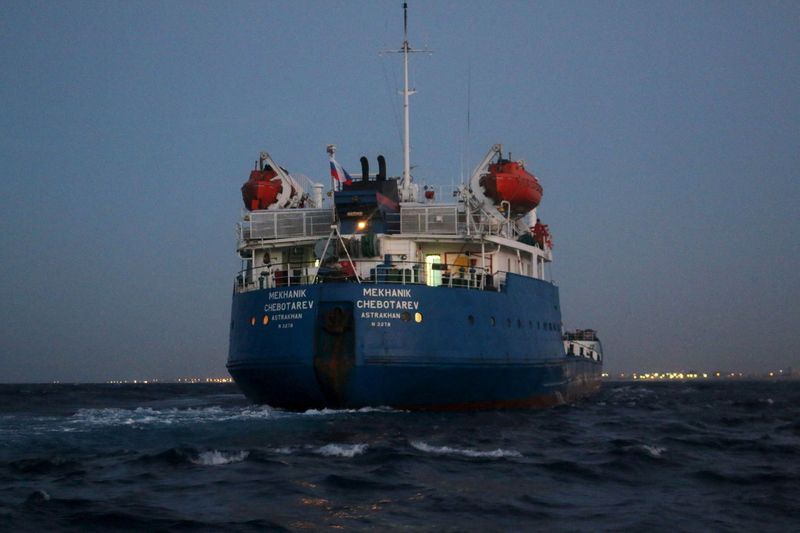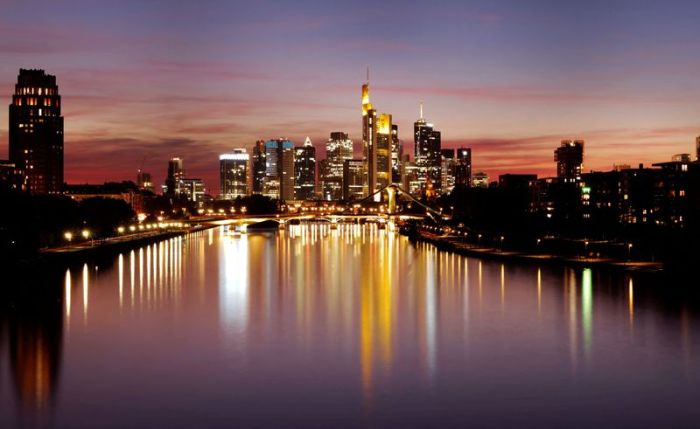LONDON (Reuters) – A Russian-operated oil tanker that Britain turned away over a week ago has yet to find a port to discharge its cargo, and many other vessels are likely to be in the same position as buyers shun trade deals following Moscow’s invasion of Ukraine.
On Tuesday, U.S. President Joe Biden imposed an immediate ban on Russian oil and other energy imports and Britain announced soon after that it would phase out the import of Russian oil and oil products by the end of 2022.
The European Union has yet to provide clarity on the prospect of a similar ban by the bloc. The European Commission, the EU executive, has only said it would continue to work on further sanctions.
Britain on March 1 banned from its ports all ships that are Russian-owned, operated, controlled, chartered, registered or flagged.
The situation is not clear-cut as Britain later said Russia could still send oil and gas to the country because the sanction targeted the vessel, not its cargo.
Dockers, however, refused to unload a tanker carrying Russian liquefied natural gas (LNG) last week, forcing it to discharge in France.
Earlier on Feb. 28, the NS Champion, operated by Russian shipping company Sovcomflot (SCF), changed course and sailed away from Britain towards Denmark, ship-tracking data on Eikon showed.
The vessel last reported its position close to Denmark’s coast on Wednesday with its status showing as underway using engine, tracking data showed.
SCF did not respond to a request for comment, and the ship’s crew could not be reached.
Under Danish law, ports are obliged to receive vessels provided there is space and security considerations are met.
Danish authorities did immediately comment on whether they had been in contact with the NS Champion.
Up to 65 million barrels of Russian crude are estimated to be on board 90 tankers, which have yet to reach destinations, predictive maritime analytics company Windward said.
Seven of those vessels, with 5 million barrels of oil, were reporting their positions as headed to the United States, Windward added.
European Union countries are divided on whether to ban energy cargoes with a Russia footprint.
Other ships with Russian gas have been able to deliver their cargoes. Two LNG tankers have docked and discharged in ports in France and Belgium since March 5, analysis by data intelligence firm ICIS showed.
Denmark is pushing for the EU to take a common decision on excluding Russian vessels from ports in the bloc, Foreign Minister Jeppe Kofod said in emailed comments to Reuters.
“It will naturally be a far-reaching decision that requires careful preparation. Therefore, it is not something you just do,” he said.
SCF was among the Russian entities the U.S. Treasury restricted in February from raising capital in U.S. markets, which shipping sources say will complicate transactions for the Moscow-listed company.
Shipowners and operators were “struggling to keep up with the unfolding sanctions and are concerned that activities that are permitted today, will be banned tomorrow,” said Alexander Brandt, a sanctions lawyer at law firm Reed Smith.
Significant numbers of Russian-linked tankers carrying crude oil and LNG call at UK ports each year as well as ships carrying steel and other goods, added Nick Austin, a shipping partner at Reed Smith.
“Those ships and cargoes will now have to go elsewhere, or more likely never leave Russia at all,” Austin said.
(Reporting by Jonathan Saul in London and Stine Jacobsen in Copenhagen, additional reporting by Forrest Crellin in Paris and Nora Buli in Oslo; editing by Barbara Lewis)



















